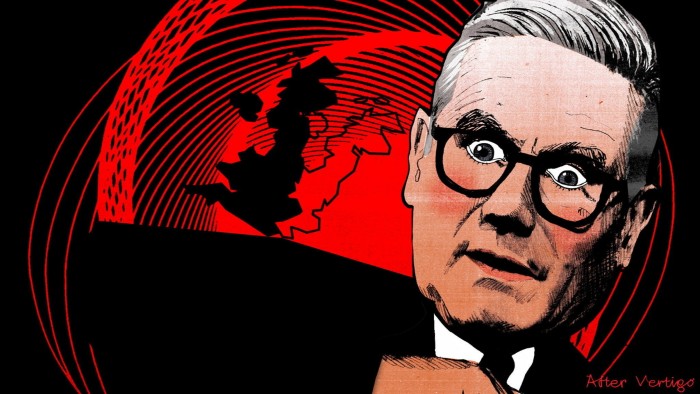Unlock the Editor’s Digest for free
Roula Khalaf, Editor of the FT, selects her favourite stories in this weekly newsletter.
At least Keir Starmer is consistent in his ability to satisfy no one. Within minutes of Labour’s new immigration plan being unveiled, the right-wing media confirmed that it was never going to be enough to pacify the hardliners. Liberals meanwhile found the tone too inflammatory — did he really need to say “island of strangers?” — and the content too damaging. It was too little, too late and too much.
Immigration hawks note that sanctioned arrivals will still be in multiples of six figures while the plan offered nothing on the thousands of asylum seekers arriving in small boats, an issue the right conflates with legal migration. Having scrapped or resisted serious deterrents, Labour is now scrabbling around Albania as a “hub” for failed applicants.
Universities and social care bewailed the new curbs, though these sectors have patently been open to abuse of visa conditions. There is little allowance for the fact that Britain’s ageing population requires either more immigrants or higher taxes to provide the services it demands.
And yet, and yet. Starmer is correct to see that something bigger is at stake. A significant section of the country has been telling leaders for years that immigration is too high. Issues of integration and strain on services are not a far-right fantasy even if cynically whipped up by political agitators. While one can certainly quarrel with specific measures, Starmer is right to act.
Polls show the UK is not anti-immigration but support has begun to slide. The numbers seeing it as good for the economy fell from 53 per cent in 2019 to 40 per cent in 2024. There has been a similar fall in those saying immigration made the UK a better place to live. While Britons support immigration, they are pro-control and integration and the view that both have been eroded is not restricted to the hard-right.
Starmer’s critics on the left say he should stop running scared of Nigel Farage’s Reform UK and instead make the case for immigration that he once believed. But, aside from the fact that the “shut up, you’re wrong” strategy has not been a triumph so far, this is to miss two essential points. First, Starmer cannot make any case until people are prepared to listen to him and, second, excessive immigration is a real and corrosive issue. Previous dismissals and broken promises played midwife to Brexit and are capable of powering Reform — or a Conservative facsimile — into office unless Labour draws the sting from the issue.
Those saying blithely that Starmer must simply “make the argument” see politics as an episode of the West Wing, where a liberal leader can change the country’s mind with a single speech. This is not the real world and in any case, Starmer is not that leader.
He must first win a hearing by showing he is listening. Not everyone voicing fears about immigration is hardline. His political strategy is rooted in the belief that ordinary, concerned voters can be peeled away from the irreconcilables.
But while Starmer has no choice, his strategy also runs the risk of making him the latest casualty of the UK’s downward spiral of democracy. Years of stagnation have broken liberal democracy’s central compact with voters, that it is the best system to deliver prosperity for each generation. The failed promises on controlling immigration power talk of a wider systemic failure which drives people towards populist solutions, including Brexit, which inevitably fail them again.
This has left leaders constantly chasing an electorate whose faith they have lost. Government becomes a permanent campaign in which parties often adopt positions they do not instinctively support but seem electorally wise. This constant state of mobilisation is exemplified by Labour MPs who, up to four years away from their next reckoning with the electorate, are panicking as if the election were months away.
No one can deny Labour’s dreadful inheritance. But Starmer is part of this trend of leaders who lack the confidence to level with voters before they are elected. Labour ruled out personal tax rises it knew it needed, forcing a hunt for revenue in ways that hit business. Mainstream parties have also promised quality public services at discount prices; immigration curbs without consequences; painless spending cuts; and that they can undo the damage of Brexit with just a modest reset.
This all obstructs the mission of restoring the economy, which is the precondition for rebuilding that democratic compact. Empty promises and ramped-up rhetoric simply deepen the sense of malaise.
Rebuilding trust and restoring the economic compact are the only ways to reverse the downward spiral. But this is the trap. Cauterising the immigration wound is a democratic necessity but it will impede his other core missions. He is reducing low skilled immigration now, while addressing labour shortages eventually, in search of an elusive sweet spot which meets political goals without too much economic pain.
Starmer’s bet is that any downsides are a price worth paying to avoid gifting the country to Reform. But he should recall Rishi Sunak’s similar calculation. Starmer faces the same frenzied opposition and Labour cannot recreate the sense of control without tackling small boats.
The UK has now spent a decade unhappily chasing populists downhill. Leaning into voters concerns but with sober solutions is ultimately the only viable path for moderates. Still, I wish I was more confident it will work.




